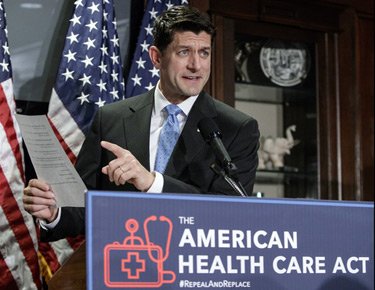That “Right to Health Care”
American Medical Association, Avik Roy, Individual Rights, Kevin Williamson, National Health Care, Obamacare

In 1949, Sir Samuel Fildes’ painting “The Doctor†(1891) was used by the American Medical Association in a campaign against a proposal for nationalized medical care put forth by President Harry S. Truman. The image was used in posters and brochures along with the slogan, “Keep Politics Out of this Picture.†65,000 posters of The Doctor were distributed, which helped to raise public skepticism of the nationalized health care campaign. By 2008,
unfortunately, the AMA was controlled by the Left and fighting for doctors’ and patients’ rights to private health care was no longer part of its agenda.
Kevin Williamson debunks the “Health Care is a right!” rhetoric.
With the American Health Care Act dominating the week’s news, one conversation has been unavoidable: Someone — someone who pays attention to public policy — will suggest that we pursue policy x, y, or z, and someone else — someone who pays a little less careful attention, who probably watches a lot of cable-television entertainment masquerading as news — responds: “The first thing we have to do is acknowledge that health care is a human right!†What follows is a moment during which the second speaker visibly luxuriates in his display of empathy and virtue, which is, of course, the point of the exercise. …
Here is a thought experiment: You have four children and three apples. You would like for everyone to have his own apple. You go to Congress, and you successfully persuade the House and the Senate to endorse a joint resolution declaring that everyone has a right to an apple of his own. A ticker-tape parade is held in your honor, and you share your story with Oprah, after which you are invited to address the United Nations, which passes the International Convention on the Rights of These Four Kids in Particular to an Individual Apple Each. You are visited by the souls of Mohandas Gandhi and Mother Teresa, who beam down approvingly from a joint Hindu-Catholic cloud in Heaven. Question: How many apples do you have? You have three apples, dummy. Three. You have four children. Each of those children has a congressionally endorsed, U.N.-approved, saint-ratified right to an apple of his own. But here’s the thing: You have three apples and four children. Nothing has changed. Declaring a right in a scarce good is meaningless. It is a rhetorical gesture without any application to the events and conundrums of the real world. If the Dalai Lama were to lead 10,000 bodhisattvas in meditation, and the subject of that meditation was the human right to health care, it would do less good for the cause of actually providing people with health care than the lowliest temp at Merck does before his second cup of coffee on any given Tuesday morning. Health care is physical, not metaphysical. It consists of goods, such as penicillin and heart stents, and services, such as oncological attention and radiological expertise. Even if we entirely eliminated money from the equation, conscripting doctors into service and nationalizing the pharmaceutical factories, the basic economic question would remain. We tend to retreat into cheap moralizing when the economic realities become uncomfortable for us. No matter the health-care model you choose — British-style public monopoly, Swiss-style subsidized insurance, pure market capitalism — you end up with rationing: Markets ration through prices, bureaucracies ration through politics.
Claiming that you have a “Right to Health Care” usually amounts to the assertion that you have a right to force somebody else to pay for goods and services for your benefit, in essence a claim that you have a right to enslave other people.
———————————
Avik Roy puts it a different way. Avik argues that our right to health care consists of our right to obtain health services through voluntary interactions with health care providers, and Government is taking away that right.
For those enrolled in government-run health insurance, it is illegal to try to gain better access to doctors and dentists by offering to make up the difference between what health care costs, and what the government pays.
That basic right—the right of a woman and her doctor to freely exchange money for a needed medical service—is one that 90 million Americans have been denied by their government. …
You see, health care is a right, in the same way that liberty is a right. And that liberty—to freely seek the care we need, to pay for it in a way that is mutually convenient for us and our doctors, is one that our government is gradually taking out of our hands.





